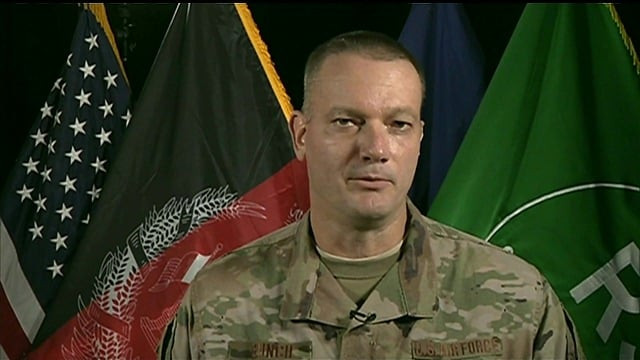Pakistan off-limits to US forces: Centcom official
Brig-Gen Bunch tells American media forces have more powers to target Taliban in Afghanistan

PHOTO Courtesy: www.defense.gov
Briefing the American press through a video conference from Afghanistan on Tuesday, he said the State Department has been engaged “heavily” with Pakistan and India to find common ground for cooperation in the future with regards to Afghanistan.
“We are only doing targeting inside of Afghanistan, inside of the combined joint operation areas in Afghanistan. And we are not, we don’t have the authorities nor are we conducting operations in Pakistan,” Bunch said, when asked specifically if the US has the authority to conduct strikes in Pakistan.
Pak-US military alliance ‘crucial to counter terror’
Responding to another question as to what the US forces were doing to disrupt the flow of militants into Pakistan, Bunch said that the US troops were looking for any opportunity to target the enemies of Afghanistan wherever they find them. After the air interdiction campaign, the US troops are now able to go after the Taliban’s support structure, he added.
The US Central Command (Centcom) official said that earlier the American troops could only target essentially in defence or in close proximity to Afghan forces, but now under the new authorities, the American troops were able to target militant networks and not just individual fighters.
He said that the role of Pakistan or India in the future of Afghanistan would be determined by the government of Afghanistan. However, he added, the State Department was heavily engaged with both of those nations as “we look to find common ground in the future”.
US won't pay Pakistan military reimbursements this year: Pentagon
Giving an overview of the situation on the ground in the wake of the new US strategy in the region, Brigadier General Bunch said that Afghanistan was the single largest collection of violent extremist organisations in the world for the US troops.
Militants from the Islamic State of Iraq and Syria (Isis) were reported to be present in Nangarhar, Kunar and as per the assessment their numbers may be in thousands, he said. Taliban militants, he added, had pockets around the entire country.
“What I can tell you is that the new strategy highlights that this is a new war. And that the gloves are off, if you will, and that we’ve got now these authorities we need to be able to go and target the Taliban network,” he added.
“So now we’re able to go after their [Taliban] weapons cache sites, their revenue generation, their C2 nodes. All the areas where they thought they were safe and they are no longer so.”
Also, Pakistan’s Ambassador in Washington Aizaz Chaudhry and US lawmakers Senator Tom Cotton and Congressman Mark Meadows have agreed that a broad-based partnership between Pakistan and the United States is vital to achieving common bilateral and regional objectives.
Pakistan prepares ‘toughest diplomatic policy’ for US
The two sides held meetings on the Capitol Hill on Wednesday during which Ambassador Chaudhry briefed the US lawmakers on Pakistan’s successes in the fight against terrorism and efforts for economic stability.
As part of his outreach to the US Congress, Ambassador Chaudhry met Senator Tom Cotton and Congressman Mark Meadows and updated them on the latest developments in the sphere of bilateral relations.
Republican Senator Tom Cotton from Arkansas is a member of the Senate Armed Services Committee and also serves on the Senate Select Committee on Intelligence, while Republican Congressman Mark Meadows from North Carolina is chair of the Freedom Caucus.
During the meetings, the ambassador briefed the US legislators about Pakistan’s successes in the fight against terrorism and the government’s efforts for economic stabilisation. He added that Pakistan shared the US aspiration for peace in Afghanistan.
“Pakistan’s domestic and security gains are at risk from continued instability in Afghanistan,” said the ambassador. He reiterated Pakistan’s position on the need for a comprehensive political process to achieve lasting peace in Afghanistan.
Senator Cotton and Congressman Meadows appreciated the ambassador’s briefings. They agreed that continued cooperation between Pakistan and the United States was essential to achieving their common objectives in the region.



















COMMENTS
Comments are moderated and generally will be posted if they are on-topic and not abusive.
For more information, please see our Comments FAQ